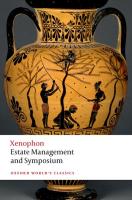
Oxford World’s Classics (2022) p/b 107pp £8.99 (ISBN 9780198823513)
These two relatively short pieces are probably among the least known of Xenophon’s substantial output. They are Socratic dialogues, the only two to have survived in full apart from those by Plato. They were almost certainly written during Xenophon’s later life when he was in exile in Sparta but refer back to his younger days in Athenian society, when it was still a democracy before the coup of 411 BC. Both deal with Athenian private life.
In Estate Management, Socrates questions what is involved in successfully running a farming estate, and why some estates are successful while others fall into ruin; in Symposium, where the scene is a men-only private party, the underlying theme is what is meant, and what should be meant, by kalokagathia (translated here as ‘gentlemanliness’, literally ‘beauty and goodness’). In both cases, traditional expectations are upended, especially for those below the salt, the non-citizens, women and slaves. The wealthy and successful farmer has trained his wife (whom he married when she was only 14, half his age) and she is now an equal partner in the business, fully able and keen to take charge when he is away; slaves too can be trained and, if they have abilities, allowed to exercise them and trusted with responsibility; all are treated with respect.
The most important characteristic of a ‘gentleman’ is not his good looks or his wealth or how he spends his time, but (as Socrates unravels) his ability to make and keep friends (philia, as distinct from the possessive love, eros). The upshot in both dialogues is the importance of treating other people right, including those conventionally looked down on, women and slaves; they are all capable of the highest competence, and if they demonstrate that, deserve to be trusted as much as any king. As the Introduction makes clear, these principles were important to Xenophon: throughout his writing, especially perhaps in his accounts of his adventures in Persia, he displays a profound interest in what makes a good leader and sees friendship as essential to this: the good leader is a friend to those he leads and pays attention to them, and this is a key part of his ‘virtue’.
In the course of developing these arguments, much is revealed about fifth-century Athenian life. How to run a farm and supervise your workers is gone into in great detail. In Symposium, as well as the different characters who take part in the discussion, a good deal of attention is given to the entertainers (slaves) who perform for them.
The ‘Translator’s Note’ begins by saying, ‘Xenophon was renowned in antiquity for the simplicity, grace and purity of his Attic style. He therefore presents his translator with few problems.’ The beautifully readable translation lives up to this billing. The only difficulties come when conceptual words occur, which may require a range of English words according to the context: these are well explained in the Notes. For instance, a key concept in Estate Management is epimeleia, which may variously include ‘care, application, diligence, practice, taking pains’. Kalokagathia, as V. says, is ‘a wholly ancient Greek notion without parallel in English’, and he has ‘used the quaint word “gentlemanliness” mainly to remind the reader that we are here faced with a view of ideal breeding and behaviour that requires some mental dislocation to understand it’.
The Introduction and extensive Notes by Emily Baragwanath deserve special commendation. Summarising and setting them in context, she argues convincingly that both works reveal Xenophon to be an innovative thinker, especially regarding the social status of women and slaves, ‘whose lesser moral and intellectual standing was taken for granted in contemporary Athens’; on the contrary, both groups may display ‘exemplary moral qualities’. The work of managing the home farm, the oikos, is every bit as important as taking part in politics or warfare and requires the same qualities. Being a ‘gentleman’ is not a matter of birth or wealth but of attitude and how one treats others. Anyone can learn these virtuous principles. These were new ideas. In one interesting passage, B. speculates on the reasons why modern readers have largely failed to recognise Xenophon as the creative, radical thinker he clearly was and seen him as plodding and conventional.
This little book gives a fine account of these two works of Xenophon, both for those who are familiar and unfamiliar with him.
Colin McDonald
